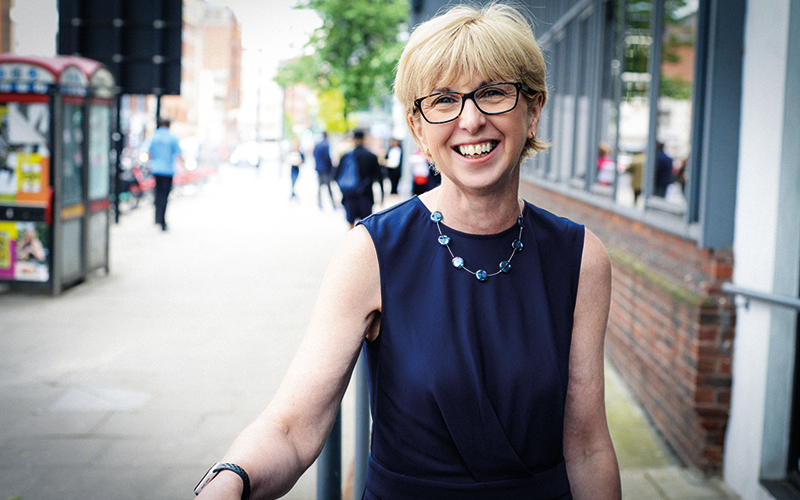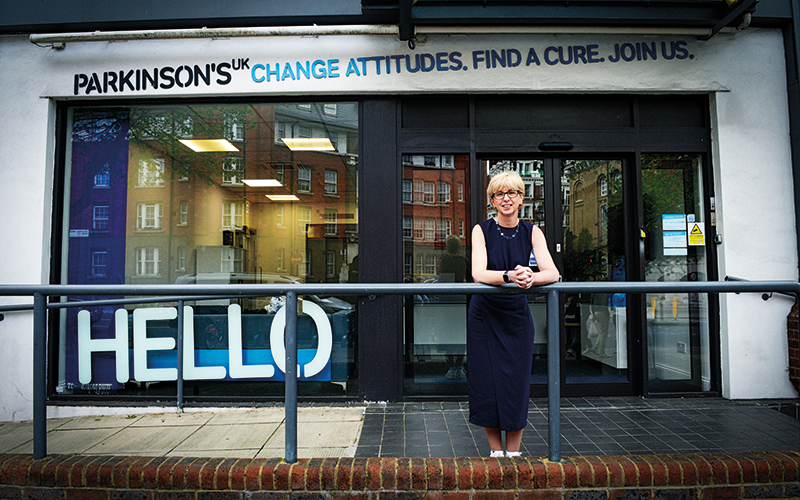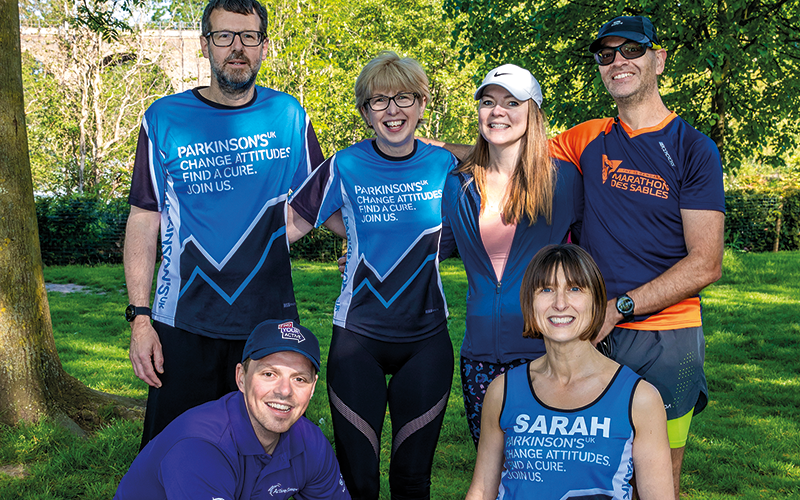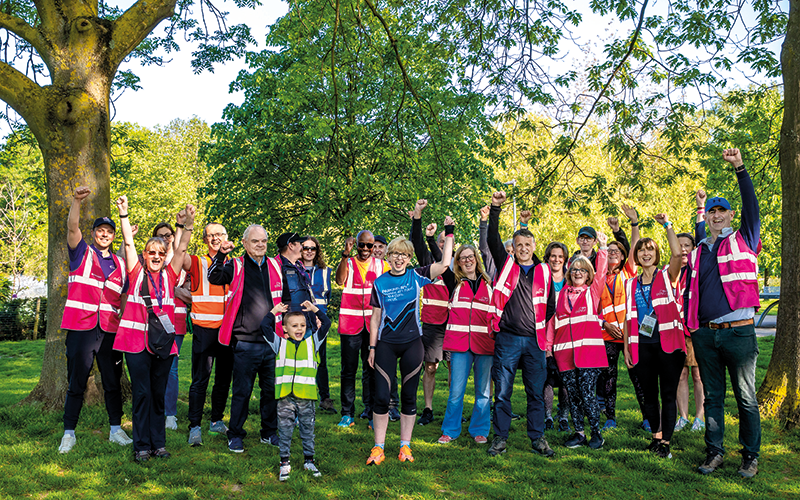
Being a ‘people’ person is nice, but knowing them to understand them is better. And the new CIPFA president clearly believes in the latter.
We’re at the London headquarters of Parkinson’s UK to meet chief executive Caroline Rassell, who is formally starting her presidency, to hear about her plans and find out more about her.
There’s a big clue as we meet in the main reception area. She knows the staff, the person featured on one of
the advertising banners – down to their name and life story – and makes time to say hello to Gary, a man who’s living with the illness and leads the charity’s parliamentary work, as he arrives to brief staff.
It quickly becomes clear that Rassell isn’t here to collect plaudits or bolster an already impressive CV. She’s here to make a difference.
A recurring theme during her interview with PF is the importance of having a connection with what you’re doing, the community that needs it and the people involved.
She explains where it comes from: “Both of my parents worked in housing. They met doing slum clearing at London County Council. It’s in our DNA. There wasn’t really any other option for me but public service, and I’m really pleased there wasn’t.”
Her career began at the Corporation of London. “It was about as far away from real life as you could get, but I learned a lot there,” she says.
Her next move was to Newham, as a senior accountant in environmental services – where staff were encouraged to be hands-on. As one of her responsibilities was waste, Rassell went out with the operatives as they collected the rubbish in Newham, then moved it to a landfill site in Aveley, Essex.
“That was mind-boggling. We were moving our rubbish somewhere else… moving our problem somewhere else,” she says.
From there, she moved to Essex County Council, where she hit her stride as group accountant, social care, and remained for nine years.
She recalls: “I experienced excellence there and really learned financial management – the importance of getting the basics right. That has stood me in good stead throughout my career.”

Listen and learn
A turning point was having oversight of social care: “I was really lucky. We had a director who encouraged people to get out and meet the people we were talking about as we made financial decisions about their future. That included people who had learning difficulties and their carers, and really understanding their plans and dreams.
“I learnt here the importance of listening, and that putting people at the centre of what you do is what matters.”
At this point, some soul searching began over developing her career. That led to the decision to move into the health service to  be deputy director of finance in South Essex – a very different world with a clear hierarchy.
be deputy director of finance in South Essex – a very different world with a clear hierarchy.
“I quickly realised we had to work within very strict boundaries. We weren’t governed by our local community; it was a national health service.”
But the scale of the organisation and its nature also creates problems: “It should be called the National Illness Service. It’s not designed to support health or prevention. It focuses just on demand and is reactive. You need to have a local focus, but that’s tricky.”
Each part of the system is judged on financial stewardship and outcomes, which often have conflicting requirements and are driven by national targets rather than what matters to people locally.
“That misses some huge opportunities,” she argues.
A move in 2014 to become accountable officer/chief executive at NHS Mid Essex Clinical Commissioning Group, which had the biggest CCG deficit in the UK, brought challenges that are now very familiar. Cuts were on the agenda, needing public consultations. There was more learning: difficult measures land better when there are choices and when delivered by a trusted profession – a supportive clinician was always needed.
Political challenge
Having to brief local MPs, who were both significant figures – cabinet ministers Priti Patel and James Cleverly – and under pressure from residents, added to the challenge. “I learnt to develop a relationship with them. Briefing them early, being honest and then accepting that they had a job to do, as I did.”
“Once we got the money under control, we could start talking to the community about what mattered to them. Some of the things they didn’t need became clear. Parents wanted access to information on childcare issues so they didn’t have to go to A&E.”
“Most of what communities want doesn’t cost much, as it’s often guidance and support”
The result: “We developed an app, guided by local parents. Those kind of interactions were really rewarding. We were also clear that most people don’t want to go into hospital or a care home. They want to live well at home.
“The power of communication can really shape what you deliver.”
She adds: “The more you speak to communities, you find most of what they want doesn’t cost much, as it’s often guidance and support.”
Working as a trustee with a hospice and as an interim director with an arthritis charity led to her appointment with Parkinson’s UK.
A key topic at Public Finance Live – and for successive governments – has been how the third sector can partner more effectively with local government. Charities are working with the same people, in the same communities, often have shared objectives and, in some areas, even work out of the same buildings.
The people supported by charities are in the middle of the public sector crisis, with local services at breaking point.
Parkinson’s is the fastest-growing neurological condition in the world. It is degenerative and there is no cure. Time is critical, but patients have to wait for diagnosis (sometimes up to two years), need medication reviews and support from consultants and Parkinson’s nurses, who are overstretched. The charity has funded 70% of the NHS‘s Parkinson’s nurses. It is not untypical now to see the charity sector is paying for staff working in the NHS.
Key themes
Agenda
The three presidential themes are ‘sustainability’, ‘social mobility’ and ‘stronger together’.
“It’s about embracing our differences and encouraging diversity. People’s true life experiences are priceless and no two people’s will be the same,” she says.
Better together
Support one another, build relationships and overcome challenges so they can flourish. Make every pound stretch further and innovate together.
Go green
The public sector represents more than 40% of GDP in most developed nations. So, when it comes to tackling the climate crisis, the UK really needs to lead from the front.
Life chances
The UK has one of the poorest rates of social mobility in the developed world. Creating opportunities will change this.

Active role
The only thing that does slow the progression of Parkinson’s is being active, and local authorities play a key part in this – not only with access to leisure but also open spaces. Rassell is an enthusiastic parkrunner, and many people from the Parkinson’s community enjoy the free weekly opportunity to come together and walk, jog, run or even race over 5km.
So why become president?
CIPFA means a great deal to Rassell. There are now huge similarities between Parkinson’s UK and CIPFA. They are both charities, both with about £35m turnover, both membership organisations. But it’s the people and the focus on making a difference that matter to her.
Rassell’s year as president will continue predecessor Jayne Owen’s themes of public services working better together and encouraging diversity. She will also be championing CIPFA’s wider social purpose: “It’s too often the case that the circumstances around a person’s birth and early years determine their life chances.”
Last year, she chaired the committee overseeing students’ and members’ business, including the updating of the CIPFA qualification. She’ll be carrying some of that work forward.
“Putting people at the centre of what you do is what matters”
“Members need to feel that it’s their organisation,” she says. “I’m keen to explore that more.”
“We’re starting to get a younger group of people, who have had a different life experience, coming through to the CIPFA council. That can only be a positive. They are going to be the leaders of the future.”
She’s also keen to bridge the gap between the generations to capture thoughts, experiences and influences from careers, so they aren’t lost.
Rassell says her approach will be unconventional: “You’re going to be surprised.” Her idea is to enable members to come together to achieve more as a powerful community, leaning on the principles that Sir Robert Peel used to found the police service – that the organisation should reflect the people, while the people reflect the organisation’s values.
“Being an accountant isn’t about numbers or being a business, it’s about people. All organisations have to be financially viable. The part we play in supporting our communities is fundamental.”
Her presidency is an opportunity to bring together her career experience across local government, health and the third sector to benefit the people, ensuring that public services deliver every day to people they both know and understand.
She also reveals that after the announcement of her presidency in PF, she received a letter of congratulations from a former mentor, highlighting how she has come back full circle.
“I’m truly living my dream.”



















